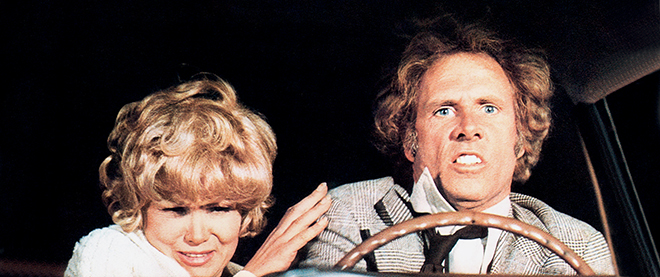Bruce Dern is leaving the ‘dernsies’ at home
After a career spent improvising, the Oscar-nominated actor doesn’t change a thing in Nebraska
Everett Collection
Share

The question had to be asked: what the hell is a dernsie? Veteran actor Bruce Dern dropped the word during a Cannes press conference for Alexander Payne’s Nebraska, proclaiming it the first movie he has ever shot without “dernsies.” Later, holding court at the Carlton—just before Steven Spielberg’s Cannes jury would name him best actor—Dern is pressed to elaborate. “Dernsies,” he explains, “are little things that you do, unpredictable behaviour or dialogue that’s not on the page.” Since forging his career in ’70s films like Coming Home and The Driver, Dern has been known for playing suspicious outliers who are uncomfortable on any page. But as he unlocks a trunk of memories, and names like Hitchcock and Kazan and Nicholson come tumbling out, those wild eyes that critic David Thomson once called “lime pits of paranoia and resentment” spark with the campfire glint of a practised raconteur.
Dern, who turned 77 last week, pinpoints his first memorable “dernsie” to his role in The Cowboys, a 1972 western in which he kills an unarmed John Wayne. The Duke had taken off his jacket so the crew could plant squibs for the bullet hits. Unbeknownst to Wayne, says Dern, he and director Mark Rydell planted a squib in the back of the jacket—“because no one would ever think anyone would shoot John Wayne in the back.” As the camera rolled, recalls Dern, “I said, ‘Turn around you son of a bitch, I want you to see this coming.’ He doesn’t turn around . . . pow! He was shocked. But he went right with it. He dropped to his knees. I walk over and shoot him two more times. That was the first dernsie ever.”
But Dern says his pal Jack Nicholson coined the word while directing him as a basketball coach in Drive, He Said. Nicholson asked him to embellish a simple shot of him walking down a corridor with something spontaneous. Dern snapped his fingers at a couple of passing cheerleaders. Dern slips into a dead-on impression of the Jack drawl: “From now on, when I say ‘dernsie,’ give me a dernsie.” Dern laughs. “We’d done nothing but dernsies in the Roger Corman movies,” he says, recalling his early days with Nicholson in the B-movie racket. “You couldn’t stay alive if you didn’t invent s–t because there was nothing on the page.”
Dern’s volatile edge is what caught Hitchcock’s eye when he cast him in Family Plot (1976). “Why me?” the actor asked on the first day of shooting. Mimicking Hitch’s plummy sarcasm, Dern recalls the response: “First of all, Bruce, Mr. Packino wanted a million dollars.” Packino? “You spell his name phonetically: Pacino is Packino. I picked you because you’re entertaining. And unpredictable.”
But Dern says Nebraska is the first movie where he didn’t change a word of dialogue, or invent a dernsie. Because, he says, Payne’s direction needed no enhancement. “This guy takes the time to shoot behaviour. You don’t have to speak. He’ll leave the camera on you.” Shot in austere black and white, Nebraska is a droll Midwest family drama, with Dern in the lead as an ornery coot who embarks on a road trip with his son to collect a million-dollar “prize” from a magazine subscription scam. The movie, which opens in November, could see Dern crown a 50-year career with a Best Actor nomination—remarkable for a character actor with just one Oscar nomination, for a supporting role in Coming Home. For some, his claim to fame is being Laura Dern’s dad.
Payne (who directed Laura in Citizen Ruth before making About Schmidt, Sideways and The Descendants) now ranks in Dern’s pantheon of six “genius” directors—with Hitchcock, Elia Kazan, Douglas Trumbull, Francis Ford Coppola and Quentin Tarantino. “No one will ever equal Kazan,” he says. “I don’t care about his politics. He had game. When I started acting, there were three goals: go to New York, become a member of the Actor’s Studio and work for Kazan. Now when they come to Hollywood, they want to have a star on the Boulevard and go to the party. Nobody continues studying.” After Nebraska’s Cannes premiere, Dern recalls, Richard Dreyfuss came up and hugged him. “He had tears in his eyes. He said, ‘Thank you for taking me back to school.’ ” And not one dernsie on the curriculum.